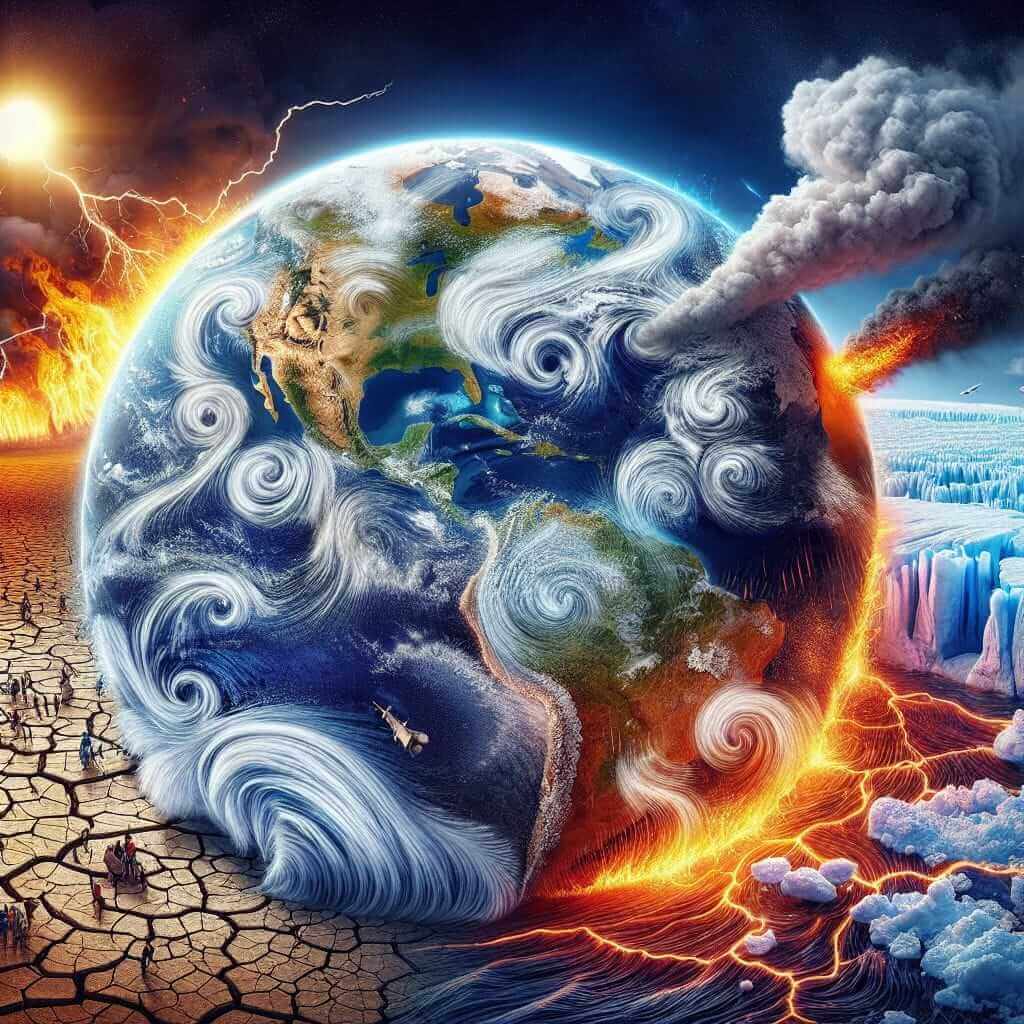The IELTS Reading section is designed to test a candidate’s ability to understand and process texts in English. The texts are taken from books, journals, magazines, and newspapers, and can be on a wide range of topics. Climate change is a popular subject in IELTS Reading tests, reflecting its relevance and urgency in today’s world. Understanding the impact of climate change on global weather patterns not only prepares you for potential IELTS questions but also enriches your general knowledge on a significant contemporary issue.
Climate change has appeared in various forms in past IELTS Reading exams, making it crucial to comprehend how it influences global weather patterns. Given the current trends, it’s plausible to assume that this topic could reappear in future examinations.
Practice Reading Passage
Below is a practice reading passage about the influence of climate change on global weather patterns. This exercise mimics the structure and complexity of an actual IELTS Reading passage, categorized as a Medium Text.
Climate Change and Global Weather Patterns
Climate change is increasingly impacting global weather patterns, leading to a variety of extreme weather events. Rising global temperatures are affecting atmospheric circulation, ocean currents, and precipitation patterns. These changes are seen across different regions and have significant implications for the environment and human societies.
One of the most noticeable effects of climate change is the increase in the frequency and intensity of heatwaves. These prolonged periods of excessively hot weather not only pose health risks but also lead to droughts, reducing water availability and affecting agriculture. Conversely, some regions are experiencing more intense rainfall events, leading to severe flooding and associated damage.
The melting of polar ice caps due to rising temperatures is another critical impact. This not only contributes to sea-level rise but also affects oceanic currents. The decrease in Arctic sea ice, for example, is disrupting the balance of heat exchange between the ocean and the atmosphere, influencing weather patterns far beyond the polar regions.
Furthermore, hurricanes and tropical storms are becoming more powerful and wetter due to warmer ocean surfaces. These storms are causing more destruction when they make landfall, leading to economic losses and displacing communities.
Changes in weather patterns also have far-reaching ecological consequences. Altered precipitation and temperature patterns are shifting the habitats and migration patterns of various species. Ecosystems are being forced to adapt, sometimes leading to a loss of biodiversity.
In summary, climate change is driving significant and observable shifts in global weather patterns. These changes pose complex challenges that necessitate coordinated global responses to mitigate their impacts and adapt to new climate realities.

Comprehension Questions
Multiple Choice Questions
-
What is one of the most noticeable effects of climate change on weather patterns?
A. Decreased ocean currents
B. Increase in heatwaves
C. Reduced rainfall events
D. Cooler temperatures -
How are hurricanes and tropical storms affected by climate change?
A. They are becoming less frequent but more powerful
B. They are becoming more powerful and wetter
C. They are occurring mainly in polar regions
D. They are diminishing in intensity
Identifying Information (True/False/Not Given)
- Climate change is reducing the frequency of heatwaves.
- Melting polar ice caps contribute to changes in oceanic currents.
- Hurricanes are less destructive due to climate change.
Matching Information
-
Match each consequence with its cause:
- Reduced water availability
- Severe flooding
Causes:
A. Increased frequency of heatwaves
B. Intense rainfall events
Summary Completion
Fill in the blanks with words from the passage.
- Rising temperatures are affecting circulation and currents. Intense rainfall leads to severe ___ and associated damage.
Answer Key
- B. Increase in heatwaves
- B. They are becoming more powerful and wetter
- False
- True
- Not Given
-
- Reduced water availability – A. Increased frequency of heatwaves
- Severe flooding – B. Intense rainfall events
- atmospheric, oceanic, flooding
Common Mistakes
One common mistake is not paying close attention to keywords in the questions and passage. For example, ignoring words like “not” or “less” can lead to incorrect answers, especially in True/False/Not Given questions. Another mistake is failing to understand the context, particularly with Matching Information and Summary Completion tasks.
Vocabulary
- Heatwave (noun) /ˈhiːtweɪv/: a prolonged period of excessively hot weather.
- Drought (noun) /draʊt/: a prolonged period of abnormally low rainfall.
- Precipitation (noun) /prɪˌsɪpɪˈteɪʃən/: rain, snow, sleet, or hail that falls to the ground.
- Biodiversity (noun) /ˌbaɪoʊdaɪˈvɜːrsɪti/: the variety of life in the world or in a particular habitat.
Grammar Focus
- Present Perfect Continuous Tense: Used to describe an action that began in the past and is still continuing, particularly to express ongoing impacts, e.g., “Climate change is increasingly impacting global weather patterns.”
- Relative Clauses: Used to provide additional information, e.g., “The melting of polar ice caps, which contributes to sea-level rise, also affects oceanic currents.”
Tips for Scoring High in IELTS Reading
- Skimming and Scanning: Skim through the passage to get the main idea, and then scan for specific information related to the questions.
- Practice Regularly: Regular practice with different types of reading passages and question types is crucial.
- Expand Your Vocabulary: A good command of vocabulary can significantly aid understanding complex texts.
- Understand Different Question Types: Familiarize yourself with the instructions and requirements of different question types.
By following these tips and regularly practicing with a variety of reading materials, you can significantly improve your IELTS Reading score. Happy studying!